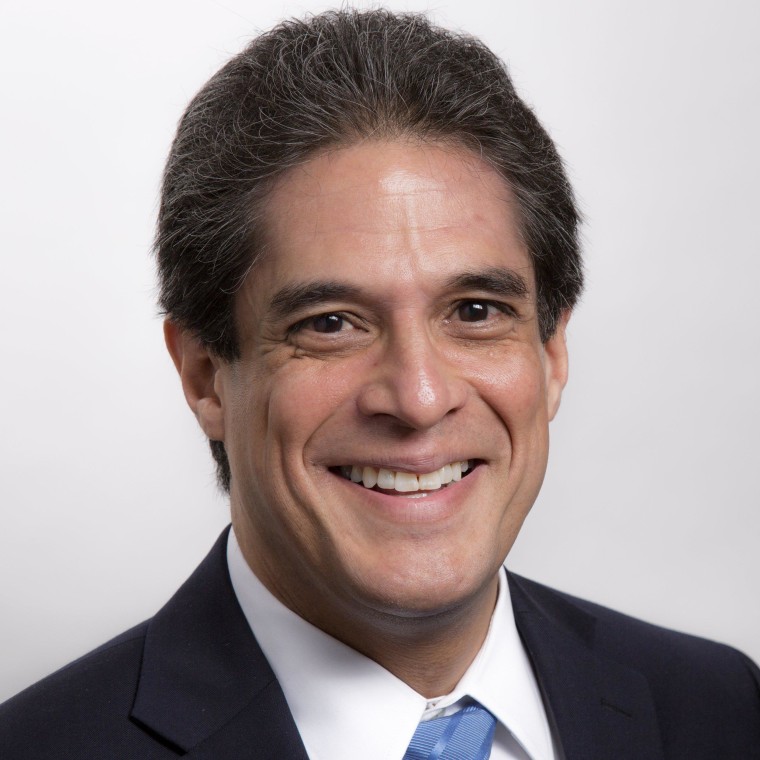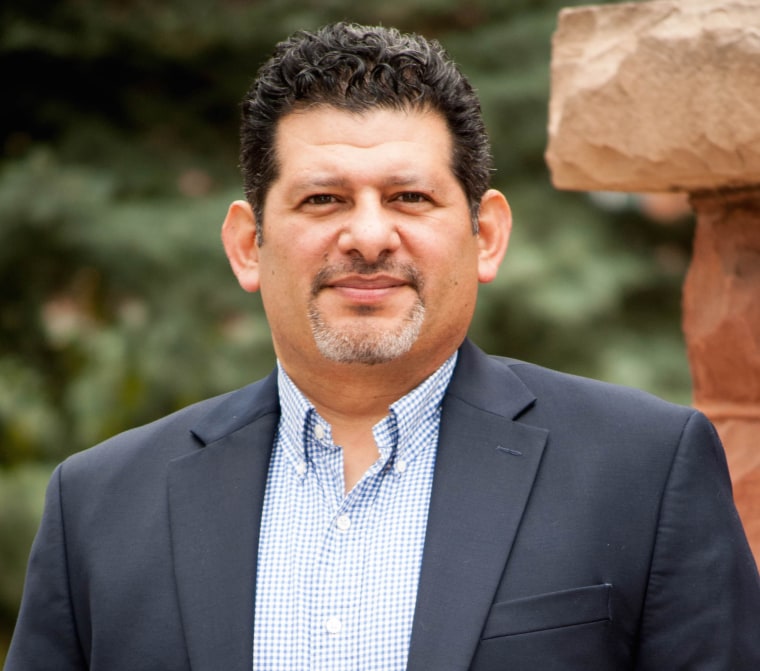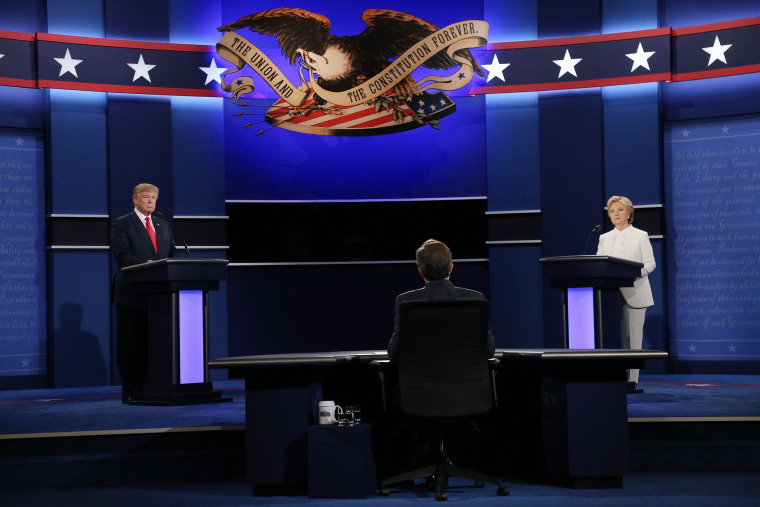In the final debate in this long presidential campaign, Hillary Clinton and Donald Trump once again sparred for an hour and a half on immigration, the Supreme Court, foreign policy, the economy and the temperament to be president in the most comprehensive policy debate of the three.
Who scored points, who had some disappointing moments, and did they make their case to prospective Latino voters on their abilities to run the country? We asked our panelists for their thoughts on tonight's debate.
Game over, Donald.

So that just happened. On Wednesday night, Donald Trump would not commit to accepting the results of the 2016 election. “I will look at it at the time,” he said, “I will keep you in suspense.” Even coming from the most erratic, undisciplined candidate in American presidential history, this was astonishing. That Trump might not be willing to continue 216 years of the peaceful transition of power in our democracy pretty much overshadowed everything else about this debate. Clinton called his response “horrifying,” and she was right.
Yes, there were highs and lows in this matchup (mostly lows). Clinton drove home how Trump’s inhumane immigration plan might look in real life; this likely played well in Nevada where Latinos make up 17 percent of the electorate.
She reminded viewers that it is possible to believe in both the Second Amendment and gun control. She discussed the Supreme Court and Iraq in thoughtful terms.
Trump managed to launch a few attacks on Clinton based on the Wikileaks revelations , though he lacked the follow-through to really do her damage.
After about thirty minutes of restraining himself, Trump descended into his trademark of insults and bullying – thereby erasing any chance he might have of appealing to that dwindling pool of undecided voters.
It was a good thing that, at this debate, immigration finally came up. However, the discussion went awry quickly, and will probably only be remembered for Trump calling undocumented immigrants “bad hombres.” Kudos to Clinton for pointing out that many undocumented immigrants likely pay more in federal income taxes than Trump does.
None of this mattered. The only takeaway from this debate – for Latinos and all Americans – is that the nominee of a major political party does not have faith in our elections.
This is wholly unprecedented.
To anyone who may have had doubts about Clinton and her judgment at times , this should be a wake-up call. Trump stated, in effect, that he puts his own ego above the system of government created by our Founding Fathers. This marks a new low for a divisive candidate and a sad day for his party. And there will be no walking this one back. Game over, Donald.
Raul Reyes is an NBC Latino contributor, attorney, journalist, and TV commentator.
Trump Has Reached a Breaking Point in our National Discussion About Women

After the last train wreck of a debate, Wednesday's focus on policy, at least initially, was refreshing. As a policy wonk, I want to dig in, but we are beyond that moment. Instead, we are in the unfortunate position of questioning a candidate’s commitment to democracy and a basic respect for human dignity.
On the former, we have heard a candidate who apparently cannot lose unless the system is rigged. He has fanned the flames of voter fraud myths, calling not only for the surveillance and intimidation at the polls that were a mainstay of the Jim Crow-era, but also invoking the possibility of rebellion, rejecting a fundamental element of democracy; the peaceful transfer of power. Tonight he refused to commit to the very basic principal that he would respect the will of the people should he lose in November.
But why would he start showing respect now? In regard to the latter, over the past several months we have heard numerous comments from Donald Trump about Latinos, Muslims, African Americans and women demonstrating his lack of respect, for which there has been no apology.
His final statement revisited every dog whistle racist trope he has uttered during this election. The breaking point, however, which should have come long before, came after we not only heard him personifying the rape culture norm of male entitlement to women’s bodies, but the personal testimony of women who have experienced it at his hand, literally.
There are those who will not change their support for either candidate. But for the one in four women who have experienced sexual assault, or the many more who have experienced sexual harassment, as well as the family and friends of these survivors, the past two weeks have resurrected a lot of pain and anger that will be hard to move beyond.
Trump’s callous response has done very little to close what looks to be a historic gender gap. Very little of what he has said or done, Wednesday night or any night, shows any evidence of his statement at the debate: “No one respects women more than me."
While Latinos may still have legitimate questions about Hillary Clinton, tonight she continued to speak to the issues and values that so many of us hold; the importance of accessible education, equal pay and fare wages, the safety of our children and the opportunities for them to live to their potential, and the value of family.
Celeste Montoya is an Associate Professor in the Department of Women & Gender Studies at the University of Colorado Boulder.
Donald Trump is a Threat to Democracy

President Lyndon Johnson once stood before the Statue of Liberty and declared, "Our beautiful America was built by a nation of strangers. From a hundred different places or more, they have poured forth into an empty land, joining and blending in one mighty and irresistible tide."
While I may dispute the emptiness of this land when Europeans migrated here, immigration is a foundational American value. In our declaration of independence from England, Jefferson outlined the reasons for taking up arms against the Crown, and among them was that the King had "endeavored to prevent the population of these States", meaning our Founders saw immigration as an important component of the perpetuation of our nation.
Our beauty as a country not only rests on our faith in the democratic process but also in the struggle to move towards a nation which pursues the values stated in the founding of our government; to form a more perfect union of these states, to establish justice, insure domestic tranquility, provide for the common defense, promote the general welfare, and secure the blessings of liberty to ourselves and our posterity.
It is important to re-emphasize in this final debate and go away with a clear national understanding that Donald Trump is an absolute incomprehensible disaster. It's not only about policy but about his lack of respect for the fundamental dignity of our democracy, established by our founders.
It is beyond our collective memory for a presidential candidate to threaten to hold our electoral process hostage but also to have a repeated history of challenging the legitimacy of those he opposes.
Not only was Trump a primary advocate of the birther movement, but he has now challenged the legitimacy of Clinton's candidacy by saying, "She should not be allowed to run" for the presidency.
A final straw for any woman watching - as if there was one required at this point - was to hear a presidential candidate at one point say, "No one has more respect for women than I do," and then turn around to our first woman presidential candidate and call her a "nasty woman" in a formal debate.
Stephen Nuño is an Associate Professor in the Department of Politics and International Affairs at Northern Arizona University and an NBC Latino Contributor.

